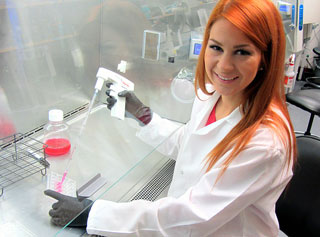From the news office of the University of California, Davis:
Cheering microbes into space

Science Cheerleader Wendy Brown, a graduate student in biomedical engineering, will recruit school kids and volunteers to collect microbial samples from a wide range of environments. (Taylor Masters/UCDavis, photo)
Wendy Brown, a graduate student in biomedical engineering, will recruit school kids and volunteers to collect microbial samples from a wide range of environments. (Taylor Masters/photo)
A University of California, Davis, microbiologist and a professional cheerleader are teaming up with “citizen scientists” to send microbes to the International Space Station and study their growth.
The project is one of eight announced Nov. 29 as winners of the International Space Station Research Competition sponsored by Space Florida and Nanoracks Inc.
The team is led by Professor Jonathan Eisen at the UC Davis Genome Center and “Science Cheerleader” Wendy Brown, a graduate student in biomedical engineering who has cheered for the Sacramento Mountain Lions, Sacramento Kings and Atlanta Falcons. Brown will work with the Science Cheerleader organization and SciStarter.com to recruit school kids and volunteers to take part. Participants will collect microbial samples from a wide range of environments on Earth, including sports venues, schools and homes.
Eisen’s lab will use DNA sequencing methods to identify the microbes in the samples. In addition, microbes from some of the samples will be grown in Eisen’s laboratory, packaged and flown to the International Space Station on a commercial SpaceX Falcon 9 rocket, set for launch in December 2013. The crew will measure how well the microorganisms grow in orbit.
In a second arm of the project, astronauts will swab different areas of the space station itself, and the swabs will be sent to Eisen’s lab for DNA analysis.
A major goal of the project is to involve the public in science, especially people who are not normally engaged by science, Brown said. Participants will get feedback on how well their samples are doing. For example, there will be a “playoff” competition between samples from different stadiums.
“Will your sample grow faster than someone else’s?” Brown said.
For Eisen, it’s an opportunity to study the microscopic life of a unique building — the International Space Station, where astronauts live and work. With funding from the Alfred P. Sloan Foundation, his laboratory has been working on outreach and educational activities relating to DNA-based studies of “microbial ecology of the built environment” (see http://microBE.net for details on their work).
“If we want to engage the public in the microbial ecology of buildings, we need to find interesting buildings to work on,” he said.
The International Space Station makes an interesting comparison with buildings on Earth for several reasons, Eisen said. For example, radiation levels are higher than on the ground, and the only way new microbes can enter is through the people and equipment that get delivered via space vehicle.
The Science Cheerleaders are a group of current and former professional sports cheerleaders pursuing careers in science. They aim to overturn stereotypes, promote broad engagement in science, and encourage young women to take up careers in science, technology, engineering and math.
The other members of the project team are: Russell Neches, graduate student at the UC Davis Genome Center; NASA engineers and Science Cheerleader volunteers Summer Williams and Mark Severance; and Darlene Cavalier, founder of Science Cheerleaders and SciStarter.com.
About UC Davis
For more than 100 years, UC Davis has engaged in teaching, research and public service that matter to California and transform the world. Located close to the state capital, UC Davis has more than 33,000 students, more than 2,500 faculty and more than 21,000 staff, an annual research budget of nearly $750 million, a comprehensive health system and 13 specialized research centers. The university offers interdisciplinary graduate study and more than 100 undergraduate majors in four colleges — Agricultural and Environmental Sciences, Biological Sciences, Engineering, and Letters and Science. It also houses six professional schools — Education, Law, Management, Medicine, Veterinary Medicine and the Betty Irene Moore School of Nursing.
Additional information:
Science Cheerleader website
SciStarter website
Space Florida announcement
Microbiology of the Built Environment
Media contact(s):
Wendy Brown, Biomedical Engineering, (814) 571 9519, webrown@ucdavis.edu
Jonathan Eisen, Genome Center, (530) 400-6066, jaeisen@ucdavis.edu
Andy Fell, UC Davis News Service, (530) 752-4533, ahfell@ucdavis.edu
Copyright © The Regents of the University of California, Davis campus. All Rights Reserved.

